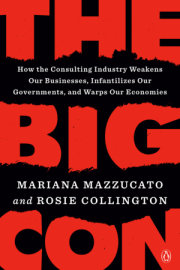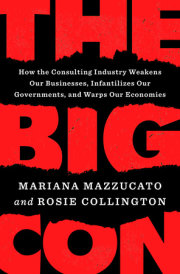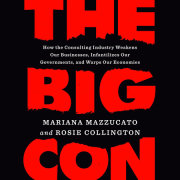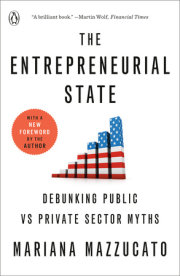1. Introduction: The Big Con-A Confidence Trick
To overcome the great challenges of our time-from pandemics to the climate crisis-requires ambition and prowess. All types of organizations in our economies must be guided by experience and technical knowledge, and people with project management skills. Businesses, governments and organizations from civil society with these capabilities can then work together to meet our collective social, economic and environmental needs.
And yet this does not describe the world we live in. Many governments have stopped investing in their own capacity and capabilities, and because they fear failure they do not take risks. Many businesses have shirked responsibility for change, and are focused on earning short-term profits through easy, unproductive strategies, such as buying back their own shares to boost stock prices, or not paying workers their fair share. Bad governance in both business and the state has over the last half century caused short-termism to overshadow investments needed for progress. These trends have depleted organizations of knowledge, skills and vision.
And one group of actors has ridden the wave of this form of capitalism, and the underlying depletion of capabilities, earning huge sums of money in the process: the consulting industry.
Consulting companies, such as McKinsey, Boston Consulting Group (BCG) and Bain & Company (often referred to as the "Big Three" strategy firms) and PwC, Deloitte, KPMG and EY (the "Big Four" accountancies), are hired by governments, businesses and other organizations to perform different types of tasks on their behalf. When consultancies are hired by businesses, the tasks they are given sometimes relate to corporate strategy, sometimes to the management and execution of a specific project and sometimes to a particular capacity such as IT or financial planning. Governments often contract consultancies to help deliver critical functions, from the development of climate adaptation strategies to the rollout of vaccination programs and the commissioning of welfare services.
Today, the size of the consulting industry and the contracts it receives have become eye-wateringly large. Their growth shows no sign of slowing down. In 2021, estimates of the global consulting services market ranged from between almost $700 billion to over $900 billion-though these figures do not give the full picture of consultancies' activity.
In every room
The omnipresence of consultants across the economy is striking. Indeed, during the first two years of the COVID-19 pandemic (2020-21), governments spent unprecedented figures on contracts with the big consultancies. By July 2020, McKinsey had already secured over $100 million from the federal government in the United States for pandemic-related tasks. In the United Kingdom, Deloitte received at least $372.9 million from the central government in 2021. One estimate suggests that in the UK over $3.34 billion worth of consultancy contracts were awarded by public bodies in 2021. In Italy, McKinsey was contracted to help organize the country's $191.5 billion share of the EU pandemic recovery fund. Consultants have also been at the highest tables of decision-making during many of the past decade's global economic upheavals, from the eurozone debt crisis to the recovery of Puerto Rico in the wake of Hurricane Maria. During that time, the Big Three and the Big Four have also been hired to help design smart cities, develop national net zero carbon strategies, propose education reforms, counsel armies, manage the construction of hospitals, draft medical ethics codes, write tax legislation, oversee the privatization of state-owned enterprises, manage mergers between pharmaceutical companies and govern the digital infrastructure of countless organizations. Consulting contracts span value chains and sectors, across countries and continents, affecting all levels of society.
Does any of this matter? Should we be worried about it? After all, aren't they just helping to make their clients more efficient, to do things the clients can't? This book shows why the growth in consulting contracts, the business model of big consultancies, the underlying conflicts of interest and the lack of transparency matter hugely. The consulting industry today is not merely a helping hand; its advice and actions are not purely technical and neutral, facilitating a more effective functioning of society and reducing the "transaction costs" of clients. It enables the actualization of a particular view of the economy that has created dysfunctions in government and business around the world.
The confidence tricks-or "cons"-of late-nineteenth-century America's Gilded Age used offers of proprietary information, awe-inspiring technology and linguistic tricks as a means for criminal acts of theft and illegal forms of wealth extraction. What we call the Big Con is not about criminal activity. It describes the confidence trick the consulting industry performs in contracts with hollowed-out and timid governments and shareholder value-maximizing firms. These contracts enable the consulting industry to earn incomes that far exceed the actual value it provides-a form of "economic rents," or "income earned in excess of the reward corresponding to the contribution of a factor of production to value creation." These rents are not necessarily derived from the ownership of scarce valuable knowledge assets, but from the ability to create an impression of value. Consulting practices and the immense resources and networks of big consultancies help to instill confidence in the value of a consultancy and the consulting profession.
While consulting is an old profession, the Big Con grew from the 1980s and 1990s in the wake of reforms by both the "neoliberal" right and "Third Way" progressives-on both sides of the political spectrum. Companies were increasingly run in the short-term interests of their shareholders. Public sectors were transformed under the credo of New Public Management-a policy agenda that sought to make governments function more like businesses and diminished faith in the abilities of civil servants. These trends also meant that those working within companies and government organizations became insecure, constantly needing to justify their decisions to others-business executives to their shareholders, and civil servants to an ever skeptical populace and media, which would blame them for any failure or mistake.
Surfing capitalism's trends
The Big Con is of course not responsible for all the ills of modern capitalism, but it thrives on its dysfunctionalities-from speculative finance to the short-termist business sector and the risk-averse public sector. It has capitalized on genuine ambition among some publics, politicians and business leaders to take on challenges including the climate crisis, the pandemic and growing inequality, which are viewed as opportunities to advise organizations that must adapt. There is an entrenched and mutually reinforcing relationship between the consulting industry and today's inherited governance forms in business and government. It is successful because of the unique structural power that the big consultancies wield through extensive contracts and networks across the economy, and their historic reputation as objective brokers of expertise.
Indeed, there is a place for consultants in our economy. Consulting advice and capacity is productive when it comes from the sidelines, from capable actors with genuine knowledge that creates value. The problem is not the act of consulting or the intentions of consultants, who often hope to effect change through their roles, but the ever expanding consulting industry moves from the sidelines to the center. It feeds off the weaknesses in our economies, hollowing out clients in the process, rather than helping them, which later only creates more opportunities for the rents accrued. It would be like a psychotherapist having no interest in her clients becoming independent with strong mental health, but rather using that ill health to create a dependency and an ever greater flow of fees.
Since we began research for this book in 2019, scandals involving consultancies have been brought to light by investigative journalists and government inquiries with increasing frequency. Barely a week goes by without news of yet another case of corruption, conflict of interest or avoidable accident involving a global consultancy. But the consulting fiascos that make the headlines are only the tip of the iceberg. Instances of clear failure or abuse by a big consulting company are often manifestations of broader, systemic problems-though they are rarely understood as such. Consultancies' numerous contracts, their claims to expertise, their financial incentives and the influence that large firms are granted over important areas of government and business are not scrutinized as symptoms of wider and deeper structural problems in the ways we have organized our capitalist system.
And the reality is that most of the time, most voters and employees do not know when consultants are at the table, how much they are being paid, who their other clients are, the extent of their often conflicting interests and what roles they have been contracted to perform. They do not know if the contracted consultancy has performed the task well or badly-and when it goes wrong, who is responsible. The nature of consulting contracts, limited liability and the business models of big consultancies means that it is their clients' employees and citizens that most often end up taking the risks of consultancy failure. This difference between the rewards reaped (large) and the actual risks taken (little) makes the rents earned even greater.
The history of modern consulting is, in the end, the history of modern capitalism: every trend has been surfed by the Big Con. In government, big consultancies have promoted and profited from trends in privatization, management reform, private financing, public services outsourcing, digitalization and austerity. In business, they have helped to entrench new models and forms of corporate management-from the spread of cost accounting to the proliferation of multidivisional corporations in the decades after the Second World War across Europe, and the rise of shareholder value maximization around the world from the 1980s. These policies were not the brainchild of consultancies, but consultancies have helped to spread and shaped them, and ultimately used them to extract value. As the world is waking up to the ills of modern capitalism and the need for more "purpose" behind corporate governance, the consulting industry is promising to reverse the problems it helped create: the current boom in contracts for "environmental, social and governance" (ESG) advice is the latest example.
In no area might the Big Con have greater consequences than in the fight against climatic breakdown. The consulting industry helped to embed forms of production driven by short-term profit maximization that have intensified carbon emissions. Now, in the face of growing concern about the climate crisis, it is riding a new wave, obstructing the large-scale transformations that are needed across our carbon-intensive economies. It is providing governments and businesses with frameworks that offer a veil of commitment without a requirement for action, including through the creation and promotion of ESG tools that former BlackRock executive-turned-
whistleblower Tariq Fancy has called a "dangerous distraction." The consulting industry is one group of many actors that have shaped and profited from a market-driven response to the climate crisis, but it is future generations and those living today in the regions most exposed to the climate crisis who will bear the risks of that response failing.
In other words, the consequences of the Big Con for our collective ability to meet the immense challenges of today are stark and more urgent than ever.
Unlearning by not doing
To respond to changes in political, social and-increasingly-environmental demands, both government and business sector organizations must be able to adapt in order to govern complicated systems and provide goods and services that people want and need. The existing activities within an organization are the building blocks for the capabilities it will need to develop in the future. Organizations in the economy are not static entities but are constantly developing. The capabilities of organizations don't simply exist but evolve over time. They are dynamic.
The more governments and businesses outsource, the less they know how to do, causing organizations to become hollowed out, stuck in time and unable to evolve. With consultants involved at every turn, there is often very little "learning-by-doing." Consultancies' clients become "infantilised"-as the British Conservative minister Lord Agnew described the effects of outsourcing on UK civil servants in 2020. A government department that contracts out all the services it is responsible for providing may be able to reduce costs in the short term, but it will eventually cost it more due to the loss in knowledge about how to deliver those services, and thus how to adapt the collection of capabilities within its department to meet citizens' changing needs. Learning, of course, also relies on interaction and engagement with other organizations. "Closed" systems of central state planning are not amenable to this kind of learning. But neither are organizations that rely on contracting out to deliver their goals.
While consultants can help clients to achieve their objectives, the claims that the consulting industry adds value to the economy and society by brokering knowledge and reducing costs is exaggerated. In the public sector, the costs incurred are often much higher than if government had invested in the capacity to do the job and learned how to improve processes along the way. Internal expertise all too often gets shunned in favor of contracting a global consultancy. Sometimes this is because the consulting firm offers to do the work pro bono or at a fee far below market rates. This is tempting for civil servants in risk-averse departments that lack resources after years of budget cuts. By charging nothing or very little in the initial contract-lowballing-the consultancy can not only shape important decisions, but also gather important knowledge about the client and gain a first mover advantage for future contracts.
It is especially striking that even in cases where the government clearly has a capability advantage, the consultancies often still win out. In Australia, for example, CSIRO (the Commonwealth Scientific and Industrial Research Organization) holds extensive climate expertise. But in 2021, those in-house scientists were denied the funding to develop the country's net zero strategy, when the government chose to work with McKinsey instead.
The consulting industry often provides legitimacy for controversial decisions. When a corporate senior manager wishes to convince their board of something, or when a government minister wants to win over others to their vision or stall meaningful action, a supportive report from a Big Three or Big Four firm can go a long way at the expense of other objectives-or even of labor agreements.
And the big consultancies that are intimately involved in important political and corporate decision-making often have egregious conflicts of interest themselves. Clients rarely have access to information about a consultancy's other clients, even when they are serving "both sides of the street." In climate consulting, for example, big consulting firms work simultaneously for governments whose populations would like to see lower emissions and for the fossil fuel companies that contribute most to the climate crisis.
For too long, the consulting industry has evaded scrutiny, undermining progress and democracy. This book not only offers a critique, but also provides concrete solutions to the current impasse. We examine the consulting industry's history, contextualize its growth within broader transformations of capitalism, and scrutinize the justifications for its widespread use among government managers, business leaders and academics. We draw on research that we and others have previously published in policy reports and academic journals, reports produced by consultancies, historical policy reports and contracting documents, and investigations by journalists who have closely followed consulting activities over many decades. We also use firsthand accounts from consultants and those who have worked with them in business and government. We have agreed to anonymize all potentially identifying information about the people we interviewed who are cited in the book, such as their name, job title and function. Our own experiences working with governments that have relied extensively on consultancies large and small have also been important sources of reflection.
Copyright © 2023 by Mariana Mazzucato. All rights reserved. No part of this excerpt may be reproduced or reprinted without permission in writing from the publisher.








